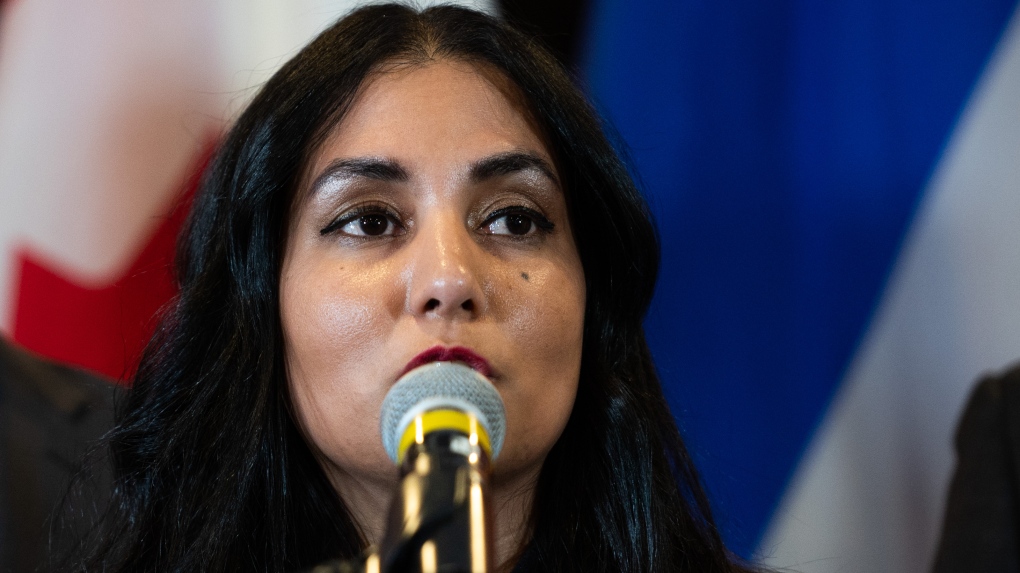B.C. creates anti-racism data committee, releases research priorities
 B.C. Attorney General Niki Sharma speaks during a ministers meeting in Ottawa, on Friday, March 10, 2023. THE CANADIAN PRESS/Spencer Colby
B.C. Attorney General Niki Sharma speaks during a ministers meeting in Ottawa, on Friday, March 10, 2023. THE CANADIAN PRESS/Spencer Colby
VANCOUVER - The British Columbia government has released 12 priorities for anti-racism research in its first update since the Anti-Racism Data Act came into effect last June.
The province says the focus will be in areas such as racial diversity within the public service, interactions with the justice system and how health care and education differs for various demographic groups.
The act allows for the safe collection and use of personal information for the purposes of identifying and eliminating systemic racism, and requires the province to release statistics annually while establishing research priorities every two years
Attorney General Niki Sharma says the priorities for 2023 to 2025 were identified by people of various racialized groups and will provide “a road map for how government can meaningfully improve services” for them.
The province has also released its first-year progress report outlining the work done under the act, including the creation of an 11-person anti-racism data committee appointed last September.
Mable Elmore, the parliamentary secretary for anti-racism initiatives, says the province will also develop “broader anti-racism legislation,” which is expected to be introduced next year.
“The work we're doing not only outlines a path forward, but it illustrates our commitment to transparency and collaboration every step of the way as we work together to eliminate systemic racism,” she told a news conference Monday.
“The next step is to move us beyond identifying barriers and to hold governments accountable.”
June Francis, chair of the anti-racism data committee, said she welcomes updated legislation, but hopes the government begins taking action on anti-racism initiatives now.
“I think that there is no reason for all ... governments to not take action. These 12 areas will model, will work hard, will focus, but all governments should be paying attention and starting their own process of anti-racism and decolonization,” she said.
“There's no reason to pause. I hope this will model the change, and that this change will trigger and ripple across all of government.”
Research priorities identified by the anti-racism data committee include:
1. Racial diversity within the B.C. Public Service;
2. Interactions with the justice system and analysis of complaints model;
3. Health outcomes and understanding of how the system is performing for different demographic groups;
4. Understanding how students across demographic groups access and use education supports and their outcomes;
5. Children, youth and family wellness at home and away from home;
6. Economic inclusion;
7. Homelessness, housing supply and security.
Research priorities identified by Indigenous Peoples:
1. Health outcomes for Indigenous Peoples to understand experiences from an intersectional and holistic perspective;
2. Education outcomes for First Nations, Metis and Inuit students from kindergarten to Grade 12 to understand experiences, including their access to and use of available supports;
3. Social determinants of safety from a holistic lens and fill related data gaps;
4. Commitment to advance the collection and use of disaggregated demographic data;
5. Conduct research in a way that acknowledges, respects and upholds the rights of Indigenous groups.
This report by The Canadian Press was first published May 29, 2023.
CTVNews.ca Top Stories

Calgary woman stranded in Mexico after husband's death during diving trip
A Calgary woman is struggling to return home after her husband died while diving in Mexico, leaving her stranded and facing financial hardship.
Fugitive U.S. rioter seeks asylum in Whistler amid warnings of more to come
An American citizen convicted of participating in the Jan. 6, 2021, riot on Capitol Hill and dodging jail time in Whistler may just be the start of an asylum-seeking rush, according to a prominent legal expert.
Special national Liberal caucus meeting called for next week after regional chairs meet: sources
A special meeting of Prime Minister Justin Trudeau's national Liberal caucus has been called for next Wednesday, sources say.
N.S. community shocked by deaths of father, daughter; suspect was wanted in Toronto shooting
A Nova Scotia community is mourning the loss of two of its members after they were shot and killed in Halifax on New Year's Eve.
Canada pausing applications for parent, grandparent permanent residency sponsorships
Canada will not accept new parent and grandparent permanent residency sponsorship applications until further notice, according to a ministerial directive.
Soldier who blew up Tesla at Trump hotel left note saying blast was to be a 'wakeup call' for the U.S.
A highly decorated Army soldier who fatally shot himself in a Tesla Cybertruck just before it blew up outside the Trump hotel in Las Vegas left notes saying the New Year's Day explosion was a stunt to serve as a “wakeup call” for the country’s ills, investigators said Friday.
Sea and Himalayan salts recalled in Canada: 'Do not use, serve or distribute'
Two brands of sea and Himalayan salt are being recalled in Canada due to pieces of plastic found in the products.
'Inadmissible' foreign nationals to pay more upon return to Canada: CBSA
Foreign nationals who refuse or are unable to pay their own way home after being denied stay in Canada will soon face steeper financial penalties should they ever attempt to return.
'It's about time': Experts in Canada support call for warnings about cancer risk from alcohol
While Canada hasn't mandated cancer warnings for alcoholic beverages, a few experts are supporting a new push in the U.S. to have the labels on the products.

































